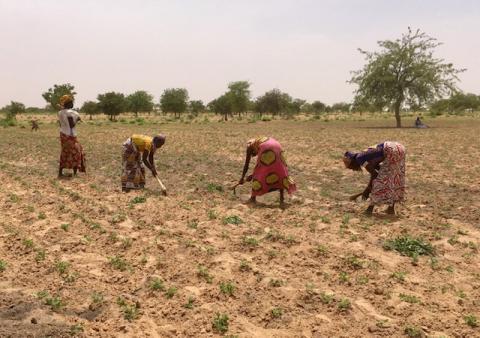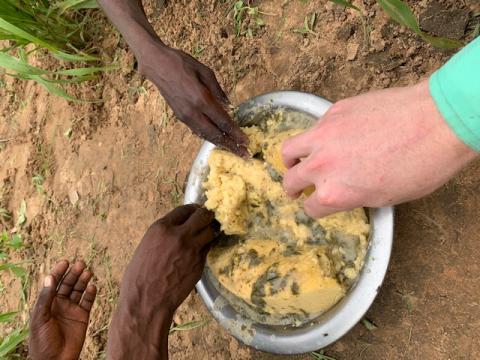I stood up to stretch my back and mop the sweat off my face. Stooping and bending to work in the millet field with a sleepy toddler on my back was tiring. I certainly didn’t have the stamina of my neighbors who could work all morning in the blazing sun with only an early morning cup of gruel for energy.
Our family had gone to help our neighbors in their field, spreading ash and fertilizer and working it into the soil with a short-handled hoe. Fieldwork isn’t the most conducive to honing language skills: There usually isn’t much conversation when everyone is spread out over a field, doing backbreaking work. But it is important in building relationships and being part of the community.
Culture demands that food be served to everyone helping with a work project, so we paused midday to sit in the shade of a large tree to eat together. We scooped sorghum porridge with peanut sauce out of common bowls with our hands, the men and women eating separately and grouped according to age. The Madara people do not converse while they eat, so the meal is a silent one. But after the bowls have been licked clean and people stretch out for a brief rest, conversation flows freely.
At the Translation Desk
We sat together poring over the text of Jeremiah, the three translators and I, discussing the meaning of each verse and how to best render it in our language.
Poetry can be difficult to translate. Not only do you need to accurately convey the meaning in the target language, but you need to transmit the vivid imagery of poetry. One difficulty is that some features of Hebrew poetry are nonexistent in the language of translation. Yet if you choose to translate the meaning of the word pictures in order to make it clear in your language, you lose color and life, making the text rather insipid.
Take, for example, a phrase which occurs frequently in Jeremiah: “the daughter of my people.” We spent some time discussing possibilities. In our language, it is not possible to literally translate “the daughter of my people.” It makes no sense; the reader would be left confused and wondering what young woman the text was referring to. So should we simply say “my people,” which is what is what the phrase represents? But that obscures much of the personification that occurs elsewhere in the book, where Judah is pictured as a young woman (e.g., Jeremiah 6:26). Saying something like, “my daughter who is my people” is possible, though it doesn’t sound natural.
Sometimes as a team we come to a consensus and move on. Other times we make a note to return and search for the best rendering later.
—West Africa


